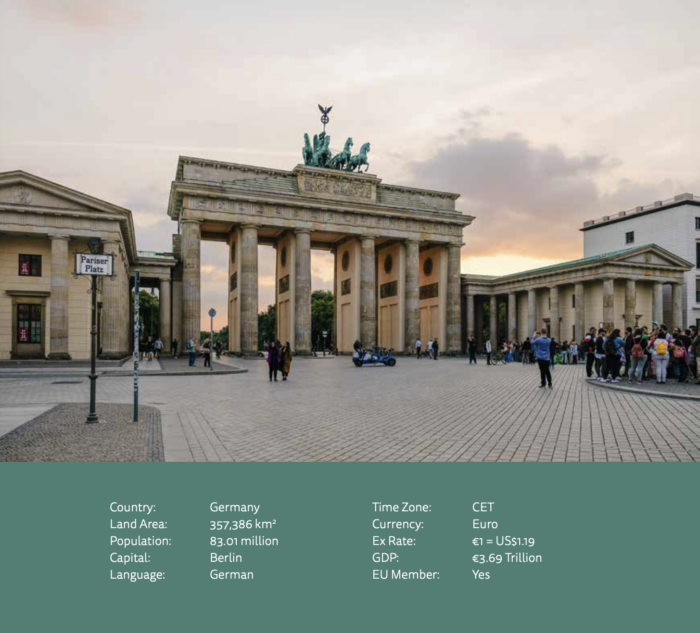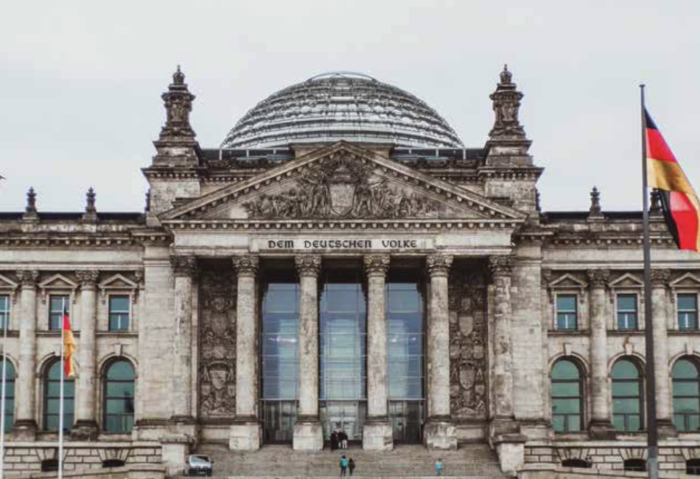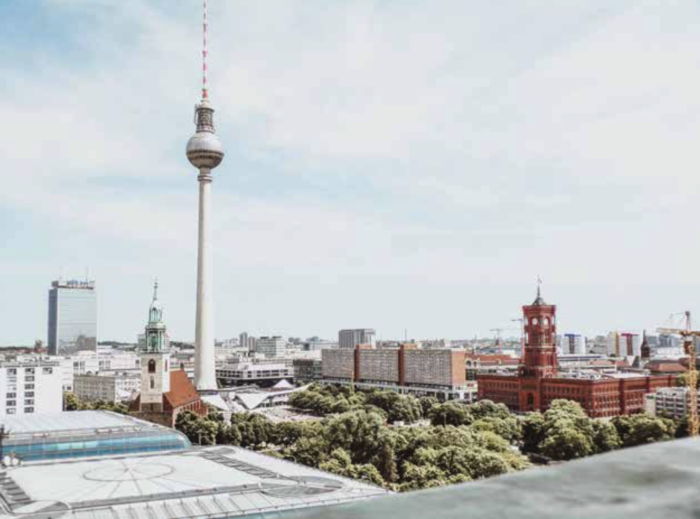Even Germany’s recent history shows they had been struggling for a unified identity for a long time. Prior to this they had been involved in a series of politically and religiously motivated wars, so it wasn’t until 1871 that this disparate set of states and territories became unified by Prussia’s military power. The new nation was consumed by a thirst for power and expansion, which directly led to the outbreak of World War I. Defeat, a disastrous peace agreement and a desire for revenge led to the rise of the Third Reich and World War II.
After the war, the allied forces divided the country into two states. The parts in the west developed into the Federal Republic of Germany, while the eastern part became the German Democratic Republic under the Soviets. Distrust between the two powers led to a period known as the Cold War and in 1961, the construction of the Berlin Wall began. The wall came down in 1989 after a peaceful revolution toppled the communist regime.
Since then, Germany has become the most dominant economic power in Europe. It is also one of the six founding countries of the European Union and became a NATO member in 1955.
Principal Industries in Germany
There are four sectors that are particularly dominant in German industry. These are the automotive, mechanical engineering, chemical and electrical industries. The top companies in these fields are global players and household names.
Other Important Industries
Germany’s secondary industries are actually the fastest growing sectors in the country. They include companies that are involved in tech and IT as well as the pharmaceutical and medical industries.
Doing Business in Germany
Germany is one of the world’s largest and most stable trading economies, offering a secure, highly developed political and economic framework. Its strong legal protections enable investors to quickly enforce their rights and protect their industrial and intellectual property. There are also other factors though that make Germany such an attractive market to enter.
For a start, lots of German business is conducted at trade shows and they host some of the largest trade events in the world. This means that Germany’s influence in business extends well beyond its borders. Contacts are crucial for business in Germany, so if you can have someone who speaks the local language introduce you and your company at trade shows it would be highly beneficial. And, with its central position at the heart of the European Union it’s easy to see why Germany is near the top of the list for a company’s European expansion plans.
Another reason why Germany is so attractive is because of its strong start-up culture. In fact, the strength of their start-up ecosystem means Germany comes in ninth out of 202 countries according to Start-up Blink. Beyond the start-up cities of Munich and Hamburg, Berlin has emerged as Germany’s leading tech hub. Berlin has distinct advantages too. With its diversity of experts and connectivity along with an international character, it is an ideal city in which to start a company.
The View from the Ground Part 1
When describing a country and its culture, you can write down all the facts and figures you like but if you want the full story, you need to get the perspective of someone with a lived experience of being there. That’s why we’ve asked Anton to give us his take on what it’s like to live and work in Germany.
One of things you need to be successful in the German or even in the DACH market is good preparation. So, you need to find out which companies you really want to tackle, and what those companies are doing, which will require individual research and another thing to look at is the job titles. There are millions of job titles in Germany. There seems to be a specific job title for every role but before reaching out to these prospects, the preparation is crucial. There are over 10,000 companies in the Mittelstand with some bigger and some smaller in Germany, so you really need to align your prospects with your objectives; figure out what you want to achieve and with whom.
I think this is good for preparation of course when you are reaching out to the prospects, getting into a discussion with them or pitching to the Germans. You really need to have a good structure for your conversation because it will not look good if you’re shifting around from one topic to another. It’s always good to do this in German of course but it’s also okayish to do it in English. Sometimes though, this won’t be possible so you really need to do some research or even ask once or twice in advance before assuming that English will suffice.
There are also quite a lot of similarities with the Dutch market, so if you’re tackling governments for example, of course they’re very conservative and decisions take a lot of time and so yeah, there are many practices in common with other markets but it’s important to look at the differences too. For example, before the Germans will accept an online meeting or before they agree to spend time in a discussion with you, they like to do a lot of research on their own. Very often when we reach out to the prospects, they don’t have a good signature in place, so they need to do that as it builds trust. For anyone who is still unconvinced, you should include a website so your prospect can just click on it and see if it is interesting for them or not. Besides the email signature, the subject line is very important when reaching out to prospects via email for example. If headlines look too salesy or if they’re too long, no one will open it because it looks like spam. Also, if you include a PDF file or PowerPoint and the recipient doesn’t know you, sometimes the emails get filtered into the spam box automatically.
The hierarchy system still comes into play in Germany, but it depends on who you’re speaking with. For example, if it’s a very old-fashioned guy then yeah sometimes they get into thinking, “OK you want to tell me what my problem is or how I can solve it but look at you, you’re still pretty young. I don’t know if you’ve had enough experience in your life to start teaching me something new.” With the new generation though, this is starting to break up. Also though, if the guy they are talking to has a high enough job title, then there is no doubt and there is respect both ways. There is still this kind of hierarchy in companies, so if you’re reaching out, be very polite. Remember to use the respectful form of “you”. Aside from showing respect, you really need to deliver on time when there is a deadline, or a timeline already agreed upon. So, you really need to deliver or get together to discuss why something is not possible. Saying nothing and not delivering is not very welcome in Germany. If someone is asking you a straight question, he really needs to get a straight answer.
At the start of a meeting in Germany, there is always a bit of small talk and people really enjoy this. Also, if you tell them something personal, not too personal, but maybe something about your dog, you’ll notice that the Germans will open up back to you, which is great for building a relationship. On the other hand, if you’re not prepared to share, you won’t reach that level of relationship.
Germany is a very large country and while the stereotypes you may have heard about certain people from certain regions are largely untrue, there are some traits I can share with you. In southern Germany, like Bavaria for example, they’re very open minded, very friendly and not so harsh. On the other hand, if you are reaching out to prospects within Hamburg or Berlin, they are very straightforward in business and very harsh. So, it really depends on which area in Germany you want to work in and who you are talking to.
Very often in the South of Germany they are extremely open and friendly. One reason for this might be to do with the very big companies they have down there like BMW and Siemens. These are of course global institutions, so they have to be open minded and have an international outlook. In these areas, it’s even okay to speak English, unlike in the old East German territories. Companies in East Germany are very conservative and often don’t look or think beyond their own boundaries.
There are also many dialects in Germany. For example, if you are in Stuttgart, people will be speaking Swabian German and if you are in Hamburg, it will be Plattdeutsch. While there are many dialects, most people, and especially in the cities speak traditional German which is called Hochdeutsch. This is the most popular form of German and is easily understood. If you go into the country though it can be hard even for Germans to understand the dialect of another region. This can occasionally make selling across regions more challenging. Like, if you’re speaking to a real Bavarian guy and he’s talking in dialect, you listen to it and sometimes, you’ll be like, “okay, I didn’t know that word before” or “I didn’t understand that sentence.” So, it can be pretty difficult if someone is speaking a strong version of a dialect but if they are speaking Hochdeutsch, then this problem doesn’t exist.
In terms of celebrations in the office, most people wouldn’t know if it’s your birthday. Colleagues are not close in respect to that level of detail. Maybe your manager and some of you team would know, in which case you might get some congratulations or a small gift, but otherwise it’s not really a thing. In general, your personal life and your business life are two distinctly separate things.
If you were speaking to two people in Germany, one could absolutely love the carnival season and the other could absolutely hate it. This is how it is in Germany; I don’t know how carnival ignites such passion in people, but they love it or hate it and there is no in between.
If you are targeting an area like Cologne or Mainz or wherever and it is carnival season, forget it. Go and choose another area. During carnival, entire businesses will shut down for 4, 5 or 6 days with people just having fun and listening to music. And, the people who don’t like it aren’t available either. They are either hiding away in their own homes and will not go out or they actually leave the area for the days while the carnival is on.
Cologne, Dusseldorf and Mainz are big carnival hotspots and of course the Germans love their national holidays. Like, on the first day of carnival on the Monday, everything is shut down. And, if you are getting more into the South of Germany then they are more religious, so they’ve got a lot of holidays from a religious perspective. The holidays are different regionally as well. In some areas you get 12 to 14 national holidays but in Berlin for example they only get 6 or 7.
The wall fell a long time ago but for some people it still plays on their mind, even if they act like it doesn’t. You can see it in the cities as well. The cities on the East side look quite poor in stark contrast to the West and its significantly better infrastructure. One story I remember from my childhood is that it was illegal to have curtains in your windows. The police had to be able to see in at all times to make sure there was no illicit activity going on.
Reactions to the wall coming down are different between generations but for me, it has worked out well. There are more opportunities on the West side, and I wouldn’t be where I am today if it had not been for that political change.
The View from the Ground Part 2
Germany is such a large country and a big market that we wanted to add the perspective of Ursula on what it’s like to live and work in Germany.
I live in the Netherlands now and am working in a really good industry so the things I miss most from Germany are my creature comforts. The German bakeries are the best. So, even if you can get the same product in the supermarket, it’s not as good as being able to pick it up, still warm, from a bakery. Also, the healthcare system is different. In Germany, you have a lot of preventative healthcare. We’ll do routine check-ups even if there’s nothing wrong with you, such as blood screens every six months and the Dutch people don’t really tend to do that. Apart from that though, there’s not so much I miss about Germany and lots I like about the Netherlands. I like the people because they are more open and more open-minded as well as outgoing and they’re not constrained by a rigid structure like some Germans are. The Germans have a need to plan everything ahead, like really precisely and in detail and it also can be annoying sometimes especially when it comes to the government or anything official.
I’m from Hamburg in the northern part of Germany and it’s fair to say that we are more reserved, and we are also often described as cold. They actually call us, “The cold North of Germany” and it’s true in a certain way. So, when for example, you move from Stuttgart to Hamburg to go to university, you may be surprised that you can’t find a group of friends that easily. It’s certainly much harder than in Munich or Berlin, but we say in Hamburg that if we are friends, we’re friends forever.
In business, Germany is still a man’s world. All the decision making is dealt with at the top level of companies and that is predominantly made up of men. The scale of the issue actually required us to pass a law that states that a certain percentage of the board must be made up of women, but we are still struggling to achieve this. I feel this is because a lot of women need to choose whether they want to make a career or have a family. There are always exceptions, but I never actually met a woman in Germany who had both. The strong businesswomen I have met and those who had their own companies never had children. I hope this is something that will change. The pace of change though is slow, and this is best illustrated by the story of a female candidate for the Green Party who had a family. The German newspapers were running stories asking how it would be possible to do a job at home and a job in parliament, “How will she cope?”, “Can a woman be a mother and a politician?” The Dutch press picked up on the story and wrote an article, the gist of which was, “Yes! Of course she can!” So, the Germans are really conservative about those things. It is changing though, and my generation are now getting into upper management but nonetheless, we Germans really love hierarchy, structure, punctuality and organisation.
The eastern part of Germany still feels forgotten in many ways and you can also see that in politics as a lot of people are voting for the far-right party, which is quite concerning. It has been this way since the wall came down. There are a lot of stereotypes thrown around as well. We say that their thinking is so far-right that it’s bordering on fascism, and they say we are arrogant and we don’t know anything about them. There is still some way to go before everything is resolved.
Networking in Germany is really important. So, if you want to be successful in business you make sure that you meet your prospect face to face after the initial pitch. We like to have a coffee, go for dinner, have lunch dates with partners and we also bring gifts a lot, but one crazy thing is we don’t really talk about money. Also, in social gatherings, we don’t talk about how much we earn or how much rent we pay but on the business side we speak about it a lot. Sometimes, when I interview German candidates, their first question is about the compensation they’ll receive. But, when you meet with your family and friends you would never discuss this. This caused a bit of an awkward moment when I was at a German wedding with my Dutch boyfriend. He was just making small talk and asked somebody how much they paid in rent and they were just like, “I don’t want to answer that”.
In terms of business gifts, it depends where you’re from. If you’re coming to Hamburg from Munich you would bring something typical from Munich and the other way around. We also do this internationally, like if we go to the Netherlands or Japan, we would bring something from Germany or from our region. Also, when I was still doing business in another industry and guests would come from overseas, I would give them traditional Hamburg bakery items.
So yes, face to face meetings are important as we are quite suspicious and very wary of being tricked or conned. I always learnt from my family that everything you see in an advertisement is a way to trick you into buying it but then when you do it is not what it seems.
In terms of other nations, we have a love/hate relationship with France and we always think that the Italians are also quite arrogant because we never understand why they won’t learn English. Thinking about it, that’s kind of ironic as not so many Germans speak really good English. The only other country I can think of who we have a strong opinion about is Austria – and we just think they’re weird. They’re ultra conservative, have a corrupt government and we also think they are racists. This is something Germany is keen to distance itself from especially with what happened during the war which now makes us more sensitive when we speak about other nations.
I have to be careful what I say now because I live in the Netherlands but the first thing that comes to mind for many Germans are the coffee shops and tulips. But, beyond stereotypes, we love the Dutch because they’re really funny, open-minded and outgoing. That’s what we like. So yeah, I think the German people and the Dutch people like each other. And of course, there is a bit of joking about which country is best and so on.
We also think the Dutch are really cool because they have a great lifestyle; they bike everywhere and they’re really casual. Also, they follow fashion and know what the next trends will be.
The pandemic brought a lot of things to the surface, and I think that really showed us the kind of areas we have to work on. Also, when it comes to digitisation, both schools and whole neighbourhoods don’t have good enough Wi-Fi and that’s why schooling from home didn’t work so well. On the global list of internet speeds, Germany gets beaten by both Iran and Morocco and that is just crazy.
Business Etiquette
Meetings are taken very seriously in Germany and are only ever organised with a specific purpose in mind. Expect there to be an agenda, which will be adhered to rigidly. Further to this, meetings always aim for decisive outcomes and results, rather than providing a forum for open and general discussion. Meetings in Germany will most likely go into considerable detail, and this may take more time. However, bear in mind that if your proposal is being examined closely, it is probably a good sign that it is being taken seriously.
In German business dealings, it is important to provide solid facts and examples to back up proposals, given the German preference for analytical thinking and rational explanations. Do not use exaggerated or indirect communication styles during business meetings with your German counterparts as this will be viewed with suspicion. German business culture has a well- defined and strictly observed hierarchy, with clear responsibilities and distinctions between roles and departments. Lastly, never forget that contacts are vital to your chances of success in Germany. So, consider outsourcing your sales to a local team or use institutions like the “Industrie- und Handelskammer” (Chamber of Industry and Commerce) whenever possible.





